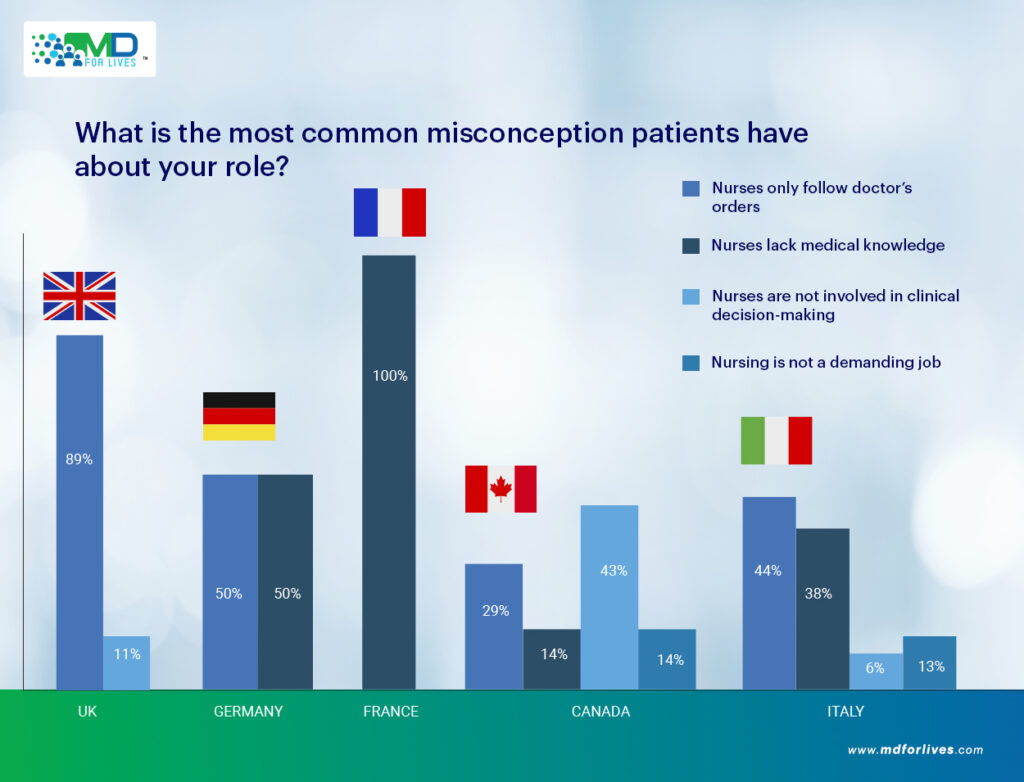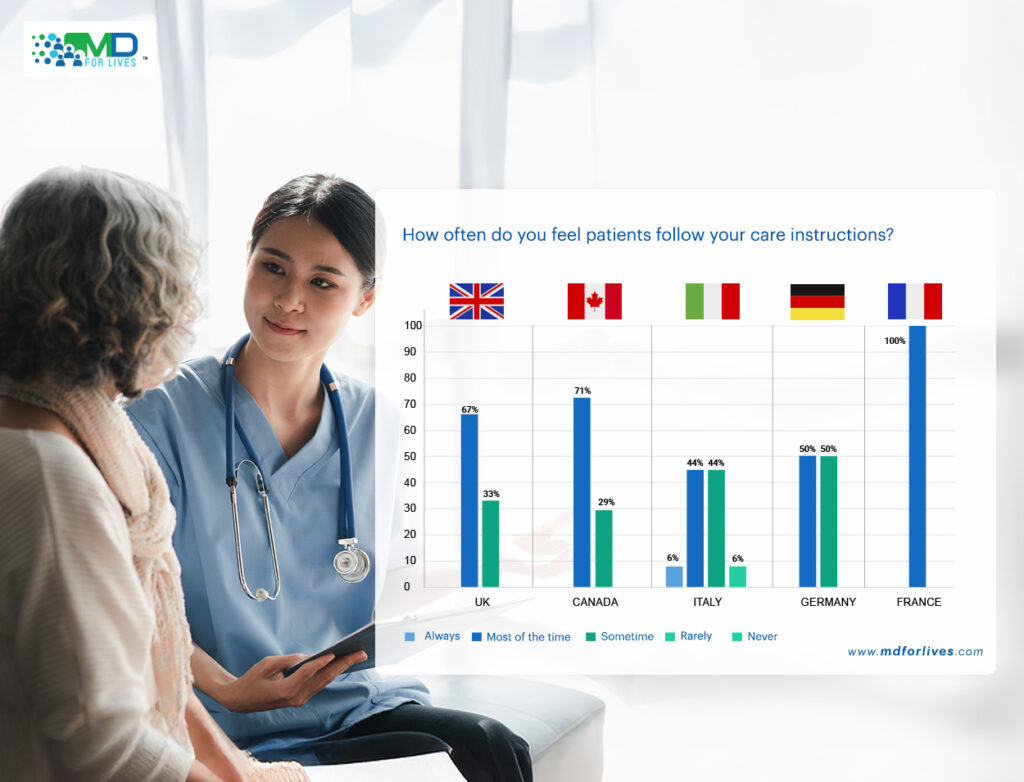We all know that nurses are the heart of healthcare. But then, why are they still fighting for recognition? They monitor vitals, manage care plans, and mend lives. They advocate fiercely for their patients, stay beyond their shifts, miss holidays, skip meals, and carry emotional weights few can understand. Yet, most of the patients (honestly, a few doctors too) still do not treat nurses as healers, but mere helpers. We are not making this claim. These are the voices of the nurses themselves who are desperate to crush all the nursing stereotypes, for once and for all. Even in a world that champions inclusivity and equity, the white coat often overshadows the blue scrubs. While doctors diagnose and prescribe, it is nurses who deliver consistent, compassionate, and critical care. Yet, around the globe, their expertise is underestimated. And what hurts the most? They are underestimated by the patients they serve.
To better understand how nurses believe they are perceived by patients, MDForLives surveyed over 10,000 nurses across five nations – United Kingdom, Canada, Germany, Italy, and France. The findings reveal a complex mix of confidence, concern, and candid reflections.
Outdated Perceptions Still Overshadow Nurses as Healers
Across countries and healthcare systems, deeply ingrained perceptions continue to downplay the critical role nurses play in patient care. Many still view nurses as “assistants” who simply carry out doctors’ orders, with little involvement in clinical judgment or decision-making. This misconception overlooks the extensive training, experience, and specialized knowledge that nurses bring to the table.
Here are the opinions collected by us on the topic ‘Widespread Nursing Misconceptions Among Patients’. And trust us, the overwhelming response that you see below has shocked us equally.

The most common misconception patients hold about nurses is that they merely follow doctors’ orders. This belief was especially strong in the UK (89%) and notably present in Italy (44%) and Germany (50%).
Apart from that, the erroneous assumption that “nurses lack medical knowledge” was also expressed by respondents in France (100%) and echoed in Germany (50%) and Italy (38%).
These insights reveal a global pattern of undervaluing the autonomy, expertise, and emotional labor of nurses.
The reality check: Perceptions and nursing misconceptions can be many. But at MDForLives, we aim to bring clarity to the conversation. We would like to tell everyone reading this article – nurses are not just helpers. They may not be holding a degree as prestigious as a doctor, but they are clinical experts as well. They have the power to detect early signs of change, coordinate across specialties, and champion patient care every step of the way. Therefore, it is 100% accurate to recognize nurses as healers.
In fact, very few know that pharma companies and healthcare institutions often reach out to nurses for their views on current healthcare treatments, patient care, medicines, and more, and pay them handsomely!
Do These Nursing Misconceptions Undermine Patient Trust?
Now that you know across countries, perceptions like “nurses only follow doctors’ orders” persist, the real question is, how deeply do these ideas impact the respect and confidence patients place in them?
Do these nursing misconceptions erode their ‘trust’ in nurses? Here is what our survey findings say:

Well, these insights brought a much-needed sigh of relief. It is reassuring to learn that 58% of nurses ‘strongly agree’ and 23% ‘agree’ to the fact that patients trust them. This acts as a powerful affirmation of the bond that underpins effective healthcare delivery.
Despite the persistent misconceptions overshadowing nurses as healers, ‘trust’ remains a steady foundation. And it is not just symbolic; it is deeply functional. It influences patient behavior, strengthens communication, and often determines how confidently and consistently patients follow through with care plans.
Now you must be thinking – “Sure, patients trust nurses. But does that trust lead to better adherence to nursing care instructions?” Well, ideally it should. But to move beyond assumptions and get a clearer picture, we turned to data. And what we found offers a striking insight into whether trust truly translates into action.
‘Trust’ Drives Compliance in Nursing Care – It is Proven!
One of the most relieving insights on patient adherence was how frequently nurses reported that patients “most of the time” follow care instructions.
Encouragingly, several countries showed strong numbers – 67% in the UK, 71% in Canada, 50% in Germany, and an impressive 100% in France. This indicates that in many parts of the world, patients not only trust nurses but also act on their guidance with consistency.

On the other hand, responses from Italy revealed a noticeably mixed perception regarding patient compliance. While 44% of Italian nurses felt that patients follow their care instructions most of the time, an equal proportion believed this happens only “sometimes”. In fact, a small segment (6%) reported that patients rarely adhere to their instructions.
However, the good part is that there is still a silver lining across all regions. Not a single nurse reported that patients “never” adhere to their instructions. The majority noted that patients comply “most of the time,” which is both reassuring and indicative of the respect patients hold for the nursing profession.
The Need of the Hour: Eliminating Misconceptions, Increasing Recognition
Our latest report reveals that nurses feel confident about the ‘trust’ patients have in their care. Yet, many nurses say that outdated nursing stereotypes still shadow their profession.
Despite years of rigorous training, deep clinical knowledge, and their pivotal role in improving patient outcomes, nurses are too often seen as “helpers” rather than “healers.” They are viewed as subordinate to physicians, with doctors frequently portrayed as primary decision-makers and public faces of care. This perception does a disservice to the nursing profession and overlooks the immense value nurses bring to every stage of a patient’s health journey.
It is time for the entire healthcare community to unite, challenge these misconceptions, and recognize nurses as healers, and not just “assistants” in modern medicine.

MDForLives is a global healthcare intelligence platform where real-world perspectives are transformed into validated insights. We bring together diverse healthcare experiences to discover, share, and shape the future of healthcare through data-backed understanding.







